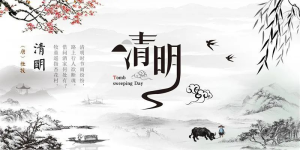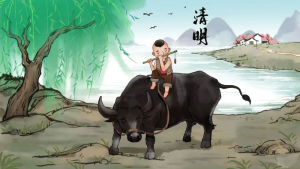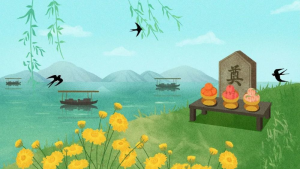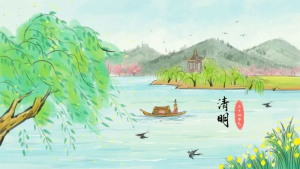

The Mourning Day
(Xu Yuanchong translation)
A drizzling rain falls like tears on the Mourning Day;
The mourner’s heart is going to break on his way.
Where can a wineshop be found to drown his sad hours?
A cowherd points to a cot’ mid apricot flowers.
Chinese translation:
杜牧《清明》
清明时节雨纷纷,路上行人欲断魂。
借问酒家何处有?牧童遥指杏花村。
The Qingming or Ching Ming festival, also known as Tomb Sweeping Day in English (sometimes also called Chinese Memorial Day or Ancestors’ Day), is a traditional Chinese festival. It falls on the first day of the fifth solar term of the traditional Chinese lunisolar calendar. This makes it the 15th day after the Spring Equinox, either 4 or 5 April in a given year.

During Qingming, Chinese families visit the tombs of their ancestors to clean the gravesites, pray to their ancestors, and make ritual offerings. Offerings would typically include traditional food dishes, and the burning of joss sticks and joss paper. The holiday recognizes the traditional reverence of one’s ancestors in Chinese culture.
The Qingming Festival has been observed by the Chinese for over 2500 years. It became a public holiday in China in 2008.

The festival originated from the Cold Food or Hanshi Festival which remembered Jie Zitui, a nobleman of the state of Jin (modern Shanxi) during the Spring and Autumn Period.
Amid the Li Ji Unrest, he followed his master Prince Chong’er in 655 BC to exile among the Di tribes and around China. Supposedly, he once even cut meat from his own thigh to provide his lord with soup.
In 636 BC, Duke Mu of Qin invaded Jin and enthroned Chong’er as its duke, where he was generous in rewarding those who had helped him in his time of need. Owing either to his own high-mindedness or to the duke’s neglect, however, Jie was long passed over. He finally retired to the forest around Mount Mian with his elderly mother.

The duke went to the forest but could not find them. He then ordered his men to set fire to the forest in order to force Jie out. When Jie and his mother were killed instead, the duke was overcome with remorse and erected a temple in his honor.
To commemorate Jie, the duke ordered all fires in every home to be put out on the anniversary of Jie’s death. Thus began the “Cold Food Festival”, a day when no food could be cooked since no fire could be lit.
The Cold Food Festival occurs on the eve of Qing Ming and is often considered as part of the Qing Ming festival. As time passes, the Qing Ming festival replaced the Cold Food festival. The custom of worshiping jie zitui also became a custom of sweeping tombs and worshipping ancestors on tomb-sweeping day. To make the visit even more meaningful, some time should be spent to remind the younger members of the family of the lives and contributions of their ancestors.
We are the chosen partners for fireworks&Civilian bomb industries worldwide, helping our customers design for efficiency, reuse resources, and revitalize natural systems.

Sign up to get regular product updates and promotion offer.
No.71-18 Anshan West Road Hezhou City Guangxi China
sales@ap-chems.com